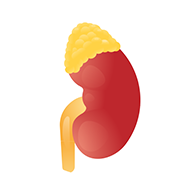
Adrenal disorders are a group of conditions that affect the adrenal glands, which are located above the kidneys. These small but vital glands produce hormones that regulate essential body functions, including metabolism, immune system response, blood pressure, and stress reactions. Understanding adrenal disorders is crucial for early detection and effective treatment.
What Are Adrenal Disorders?
Adrenal disorders occur when the adrenal glands produce too much or too little of certain hormones. The most common adrenal disorders include Addison’s disease, Cushing’s syndrome, adrenal hyperplasia, and adrenal tumors. Each of these conditions can have significant impacts on overall health.
Symptoms
The symptoms can vary widely depending on the specific condition and the hormones involved. Common symptoms include:
- Fatigue: Persistent tiredness that doesn’t improve with rest.
- Muscle Weakness: A feeling of weakness in the muscles, making daily activities difficult.
- Weight Changes: Unexplained weight loss or gain.
- Skin Changes: Darkening of the skin or easy bruising.
- Mood Swings: Changes in mood, including depression or anxiety.
- High or Low Blood Pressure: Fluctuations in blood pressure can indicate an adrenal issue.
Causes of Adrenal Disorders
Adrenal disorders can be caused by various factors, including autoimmune diseases, infections, genetic mutations, and tumors. For instance, Addison’s disease is often caused by an autoimmune response that damages the adrenal glands, while Cushing’s syndrome may result from prolonged use of corticosteroid medications or tumors that produce excess cortisol.
Diagnosing Adrenal Disorders
Accurate diagnosis typically involves a combination of medical history, physical examination, blood tests, and imaging studies. Blood tests can measure hormone levels, while imaging studies like CT scans or MRIs can identify abnormalities in the adrenal glands.
Treatment Options
Treatment depends on the specific condition and its underlying cause. Here are some common treatments:
- Medication: Hormone replacement therapy is often used to treat conditions like Addison’s disease. Medications can also manage symptoms and correct hormone imbalances.
- Adrenalaectomy: In cases of adrenal tumors, surgery may be necessary to remove the tumor and restore normal adrenal function.
- Radiation Therapy: This treatment is used for certain types of adrenal cancer.
- Lifestyle Changes: Maintaining a healthy diet, regular exercise, and stress management can support adrenal health.
Management
Living with an adrenal disorder requires ongoing management and regular check-ups with healthcare providers. Patients should follow their prescribed treatment plans, monitor symptoms, and make lifestyle adjustments as needed. Support groups and counseling can also be beneficial for coping with the emotional aspects of these conditions.
Adrenal disorders can significantly impact quality of life, but with proper diagnosis and treatment, individuals can manage their symptoms and lead healthy lives. If you suspect you have an adrenal disorder, consult with a healthcare professional for a thorough evaluation and personalized treatment plan.
For more information, contact us!
